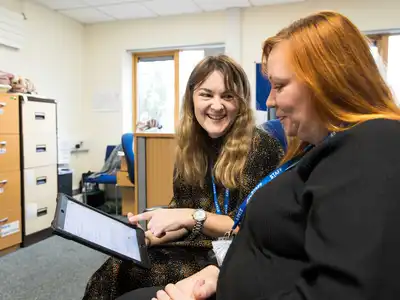From autumn 2021, a reformed suite of NPQs became available for teachers and leaders who wanted to develop their knowledge and skills in school leadership and specialist areas of teaching practice.
It was also recently announced that a further specialist NPQ will become available in autumn 2022.
The full suite of specialist NPQs include:
- Leading Literacy
- Leading Teacher Development
- Leading Behaviour and Culture
- Leading Teaching
- Leading Primary Mathematics
You can read the frameworks in full, but here are the top six opportunities created by specialist NPQs and why they present an exciting opportunity for continued professional development:
1) An opportunity for teachers to master their craft:
Teaching is complex. It takes teachers many years to develop the knowledge and skills required of them. Along with the Early Career Framework (ECF), the specialist frameworks provide a formal recognition of how much knowledge and skill is expected of teachers in classrooms up and down the country.
Rather than taking this development for granted, or expecting teachers to learn by trial and error, the specialist NPQs provide a formal framework through which they can hone and develop expertise in their craft. This enables all teachers and leaders to access a uniform knowledge base from which they can draw proven techniques and apply them in their own settings.

2) A different way to think about progression:
There can be tendency in any sector to think about career progression as ‘moving up’ into leadership roles. In a school context, this may create pressure on teachers to equate progress with moving away from what they love – teaching pupils in the classroom.
The specialist NPQs provide a fresh approach that validates teachers and leaders in choosing to focus on developing their in-class practice through numerous professional development options. This supports teachers and help them to keep getting better throughout their time in the classroom.
3) Participants can develop the knowledge most pertinent to their role:
The specialist NPQ frameworks allow participants to focus on the knowledge and skills particular to their role or interests, whether that is behaviour and culture, leading teaching or teacher development.
In practice, an aspiring head of year can enrol on the NPQ for Leading Behaviour and Culture to sharpen their knowledge of behaviour systems. At the same time, a colleague interested in progressing into an induction lead role can hone their understanding of effective CPD design on the NPQ for Leading Teacher Development.
Rather than a whistle-stop tour of all the problems and challenges of middle leadership, the five specialist NPQs each provide significant depth on those issues most relevant to teachers’ roles, interests and common challenges.
4) Depth courses that allow participants to get into the detail:
Put simply, covering aspects of teaching and leading in five qualifications allows more time to learn about and apply the specialist content in each. These ‘depth’ pathways provide more time to dig into the detail of what works, where, why and how, with the clear goal of improving pupil outcomes with evidence-informed knowledge.
"[The NPQs] are part of a wider set of teacher development reforms which together will create a ‘golden thread’ of high-quality evidence underpinning the support, training and development available through the entirety of a teacher’s career."
- Department for Education, 2022
5) Common content across all specialist frameworks:
As well as developing specialist knowledge, the NPQs also address the knowledge and skills relevant to all leaders: how to develop excellent culture, how to implement change and how to develop and bring staff along with you through professional development.
These areas are all the more powerful because they are delivered alongside specialist knowledge. For instance, a teacher on NPQ for Leading Teaching can learn about how to design a great curriculum, whilst also developing actionable insights into how they might best implement it.
6) A national common experience and a shared language in teaching:
Because the NPQs are implemented at scale across the school system, they act as a central part of the ‘golden thread’ of professional development that runs through every stage of teachers’ careers.
These specialist qualifications all refer to the same evidence base as the other NPQs and the early career framework. This commonality provides all teachers with a shared language around the sector in general and professional development in particular.



